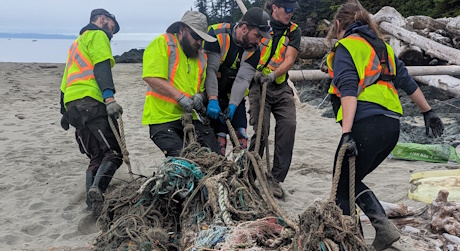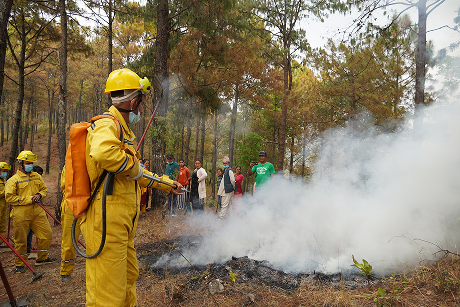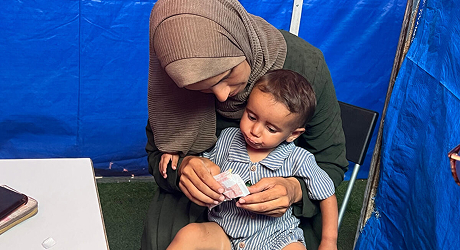Footprints Project
Since 2005, travelers like you have helped us change the world through micro-donations.

-
A total of
3378
Travelers
-
donated
$19598.61
(94% funded) -
to help improve
Environment
-
impacting
11000
people -
in
Canada
This voluntourism initiative educates participants on marine plastics, guides them to cleanup sites, and connects them to local businesses, all while empowering them to make a positive environmental impact. By encouraging participants to share their efforts and rewarding them with incentives, the project fosters a sense of community involvement and commitment to preserving the region's natural beauty.
Success is the collective removal of 20,000lbs of marine debris by visitors and residents actively participating in #LivetheWildPledge by removing one bag of ocean plastic debris from remote coastal beaches and bringing their materials to a collection site.
Project background
Rooted in the Great Bear Rainforest, a provincially protected area, Vancouver Island North is home to ancient coastal rainforests, towering mountains, and thriving ecosystems. The area offers a rare opportunity to trek in remote and unspoiled nature, see and experience wildlife, and discover new cultures. It is our responsibility to preserve and protect it – now and for the future.
This part of North Vancouver Island is incredibly diverse: it has 13 unique First Nation groups that are part of the Kwakwaka’wakw Territory and have a long ancestral history and claim to this region. Many tourists interested in First Nation history come to this region to learn and see some of the local cultural landmarks.
This coastal area is also threatened by abandoned, lost, or discarded fishing and ghost gear (ALDFG); as well, human-generated debris on the shorelines has increased dramatically since the 2021 Zim Kingston container spill. This environmental disaster resulted in 109 shipping containers lost outside the port of Victoria, four of which washed up in Cape Scott Provincial Park, and debris has still been depositing materials on the shorelines to date.
Despite multiple years of concentrated clean-up removal and efforts, shipping container and ALDFG materials still amass in high volumes on the shoreline. Marine and shoreline pollution is one of the largest challenges facing the community of Vancouver Island North and so this community needs the support of our visiting recreationalists to enhance and maintain these special places while reducing the amount of microplastics in our local ecosystems.
Project overview
This collaborative voluntourism initiative will engage tourists in the important work of removing ocean plastic debris from remote coastal beaches within Kwakwaka’wakw First Nations Territory.
Visitors will be educated on common sources and impacts of marine plastics and provided with a collection bag and locations for drop offs. Those who participate will be encouraged to share a photo with their collected debris and given an incentive or reward, such as discounts to local businesses.
By engaging both local communities and tourists, this project unites conservation efforts with people's love for nature and will empower diverse groups of visitors to truly #LivetheWildPledge and leave each place better than they found it.
Starting at designated debris collection/drop off points, outdoor recreators learn directly from local ambassadors about the common sources and types of ocean plastics that they might encounter on beaches. Each disposal site will be maintained throughout the summer season thanks to our surrounding communities and businesses.
All materials will be collected for data tracking purposes and recycled through the Ocean Legacy Foundation. Funds from this program will largely be dedicated to infrastructure, such as signage, appropriate collection bins, and maintenance of collection and disposal sites.
The project's aim is to remove plastic pollution from shorelines and establish secure collection areas to prevent waste from entering ecologically sensitive environments within our community. By creating cleaner environments, we are protecting sensitive species and local biodiversity.
Project outcomes
1) Data of shoreline marine debris removed including material types, and weights.
2) Number of participants and partners.
3) Digital Campaign total outreach: number of page views, number of unique visitors, number of referrals, click-thru rate, engagements, and post reach.
Monitoring engagement
The total number of participants will be monitored by the number of tote bags, collection site drop-offs and incentive cards distributed.
Tote bags distributed:
Our goal is to circulate 2,000 tote bags for this campaign. There are an estimated 100,000 visitors and tourists that go to the North Island each year. If 2% participate in this project and each participant collects 10 pounds, we could easily reach and exceed our weight goals.
As well, we anticipate that additional people will participate in this project regardless of having a tote bag.
Number of business discounts and offers redeemed:
We will work with local businesses to track any unique promotional offers that are redeemed to see how this may have increased business to a specific business location.
Digital Campaign total outreach:
This initiative will be promoted globally and locally by a digital campaign: a dedicated landing page on the Vancouver Island North Tourism (VINT) website and Ocean Legacy website, paid social media ads, newsletter inserts, and organic social media. An earned media report will be produced in collaboration with VINT to capture the total digital engagement.
What costs are covered?
Equipment Materials/Supplies
- Collection site infrastructure at 8 drop-off locations
- Collection bins (x14) with signage with educational Info, QR codes, and local photography
printing for each bin
- Purchase of canvas collection bags
Contracted Services
- Design of signage material
- Cost of printing collection site signage and campaign material (posters for businesses,
inserts, local, newspaper advertisements)
Labour
- Installation of collection site infrastructure at each location
- Creation of campaign and outreach materials
- Training visitor center employees with information about project
- Labour to manage and collect debris from collection sites (2x a month)
- Data collection and reporting on weights and impacts
- Sorting and loading of materials for transportation to OLF recycling facility
Travel
- Mileage paid out at $0.61/km for monthly collection site installation and pickups (estimated
6000 kms)
Partner and community involvement
The Ocean Legacy Foundation worked with Vancouver Island North Tourism and 4VI to create the project.
The following businesses offered pick up/drop-off locations:
Scarlet Ibis, Outpost, Port Hardy Visitor Centers, Port McNeill Visitor Centers, Port Alice Visitor Centers, 7 Mile Depot, Fox’s Port Hardy
The following businesses provided incentive cards or discounts:
Mcwilkies Food truck in Port Alive, Port Hardy Museum, Kwa’lilas hotel in Port Hardy, U’mista gift shop in Alert Bay, Essentials Refillery in Port McNeill, Devil’s Bath Brewing in Port McNeill, Sport Store in Port McNeill
How does this project fit into a larger strategy?
This project can be implemented yearly during the spring and summer months and incorporated into all coastal communities and municipalities to enable larger voluntourism collection efforts.
Traveling soon? When you buy travel insurance with us, you can make a contribution towards a cause you care about.
Get a quote




